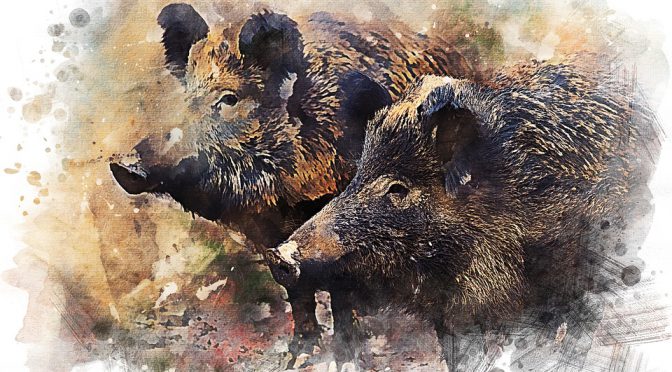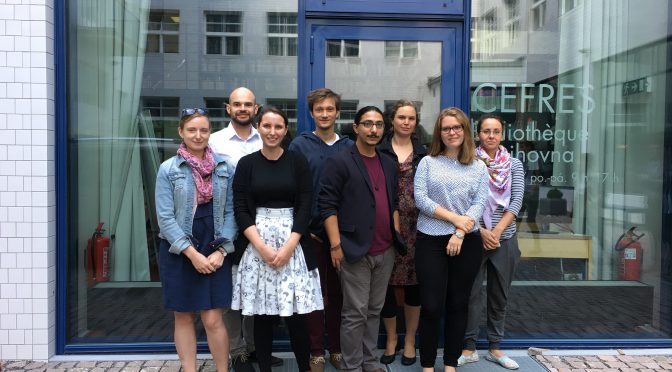Workshop
Organized by the team of Bewildering Boar project at CEFRES – Aníbal Arregui, Luděk Brož, Marianna Szczygielska and Virginie Vaté together with Erica von Essen (Swedish University of Agricultural Sciences) kindly supported by the Swedish Hunting Association through the grant “Challenges Facing Swedish Hunting Ethics in Post-Modernity”.
When: 16-17 October 2018
Where: Prague, AV ČR, Národní 18, Prague 1
Language: English
See the call for paper here.
Programme
TUESDAY 16 OCTOBER 2018
(joint programme with Anthropology of Hunting & Conservation Network)
9.00 – 9.10 Welcome address (T. Petrasova, J. Woitsch)
9.10 – 9.20 Introduction (A. Arregui, L. Broz, M. Szczygielska, V. Vaté & E. von Essen)
9.20 – 10.35 Session 1 (chair: E. von Essen)
9.20 – 9.45 Engaging with Hunting: Mosaic Pieces of Larger Pictures
Garry Marvin (University of Roehampton, London)
9.45 – 10.10 Hunters and Wild Boars: the (inter)corporeality of a relationship
Thorsten Gieser (University of Koblenz-Landau)
10.10 – 10.35 Wild boar hunting in the French Alps: between “objectivation” and “subjectivation” of animals
Coralie Mounet (University of Grenoble)
Coffee break
10.55 – 12.35 Session 2 (chair: A. Arregui)
10.55 – 11.20 “Ça c’est pas d’la chasse ! – That’s not hunting!” Perspectives on wild boar hunting in Southern Champagne and Northern Burgundy
Virginie Vaté (CNRS, CEFRES)
11.20 – 11.45 Wild boar hunting and population control in France. An analysis of public policies and their consequences for the relationship between hunters and wildlife
Alain Gigounoux (Departmental Federation of hunters of Lot and Garonne)
11.45 – 12.10 Transgressing the ‘wild’: duck trapping machines and wild boar spaces in the Netherlands
Eugenie van Heijgen (Wageningen University)
12.10 – 12.35 Hunting of wild boar in Uruguay: global discourses and local conflicts
Juan Martin Dabezies (Universidad de la Républica, Montevido)
Lunch
13.45 – 15.00 Session 3 (chair: P. Du Plessis)
13.45 – 14.10 How Wild Boar Hunting is Becoming a Battleground
Erica von Essen (Swedish Biodiversity Center, Swedish University of Agricultural Sciences, Uppsala)
14.10 – 14.35 Animal Welfare Evaluation of Wild Boar (Sus scrofa) Trapping
Åsa Fahlman (Swedish University of Agricultural Sciences, Uppsala), Johan Lindsjö, Therese Arvén Norling, Odd Höglund, Petter Kjellander, Erik O. Ågren, Mats Stridsberg, and Ulrika A. Bergvall
14.35 – 15.00 Adapting Hunting and its Conservation
KAVBH Avi (Max Planck Institute for Social Anthropology and the School of Anthropology and Conservation, University of Kent)
Coffee break
15.30 – 17.00 Discussion 1 (chair: L. Broz)
(coffee available, stretching pauses will be made ad hoc)
19.30 The evening programme
WEDNESDAY 17 OCTOBER 2018
9.15 – 10.45 Session 4 (chair: M. Szczygielska)
9.15 – 9.40 Climatic effects on wild boar population dynamics
Sebastian G. Vetter (University of Veterinary Medicine, Vienna), Thomas Ruf, Claudia Bieber, Walter Arnold
9.40 – 10.05 Editorial Boar. Animal Amendements on Barcelona Urban Relationality
Anibal G. Arregui (CEFRES-Charles University)
10.05 – 10.30 Urban Wild Boar Conflict in Barcelona
López-Olvera Jorge R. (Universitat Autònoma de Barcelona, Departament de Medicina i Cirurgia Animal), Castillo-Contreras Raquel, Mentaberre Gregorio, González-Crespo Carlos, Conejero Carles, Fernández-Aguilar Xavier, Colom-Cadena Andreu, Lavín Santiago
Coffee break
10.50 – 12.30 Session 5 (chair: KAVBH Avi)
10.50 – 11.15 A Tale of Two Boars: Ungulate Management in Italy and Germany
Michael Gibbert (University of Lugano), Stefano Giacomelli, Roberto Viganò
11.15 – 11.40 Mess, Risk and Enchantment: disturbing place with reintroduced wild boar
Kieran O’Mahony (Cardiff University)
11.40 – 12.05 Boar(der) Control. Governing Mobile Wild Boars in the European Border Regime
Larissa Fleischmann (Martin Luther University Halle-Wittenberg)
12.05 – 12.30 Fences of “Self-Devouring Growth”: Infrastructures of Containment and their Unintended Effects
Pierre Du Plessis (Aarhus University)
Lunch – Lunchtime address (J. Heurtaux)
14.00 – 15.15 Session 6 (chair: L. Fleischmann)
14.00 – 14.25 Wild Thing: Lessons from Wild Boars Featured in Polish and Czechoslovak Cinema
Marianna Szczygielska (Max Planck Institute for the History of Science, Berlin)
14.25 – 14.50 Of past and present pig slaughters: changing consumption trajectories and reconfiguring the future in a Romanian mountainous commune
Teodora Goea (University of Manchester)
14.50 – 15.15 Facing the Pig Multiple: Knowledge Drift Towards Porcine Futures
Ludek Broz (Institute of Ethnology, Czech Academy of Sciences, CEFRES)
Coffee break
15.45 – 18.00 Discussion 2 (chair: V. Vaté)
(coffee available, stretching pauses will be made ad hoc)
19.00 Dinner



